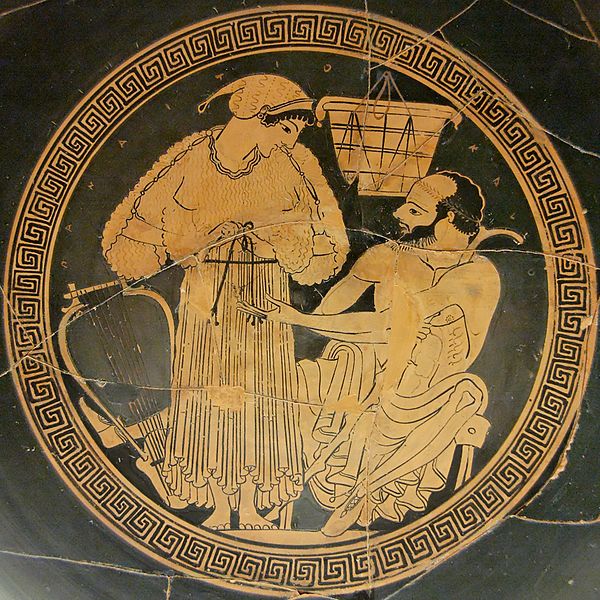Earlier I posted a passage from the Odyssey where the narrator tells us that Penelope raised the slave Melanthô and gave her toys. This detail is paired with the slave woman’s sexual behavior—she is now a bad slave because she is having sex with one of the suitors.
Odyssey, 18.321–5
“Then fine-cheeked Melanthô reproached him shamefully. Dolios fathered her and Penelope raised her, she treated her like her own child and used to give her delights for her heart. But she did not have grief in her thoughts for Penelope. Instead she was having sex with and feeling affection for Eurymakhos.”
τὸν δ’ αἰσχρῶς ἐνένιπε Μελανθὼ καλλιπάρῃος,
τὴν Δολίος μὲν ἔτικτε, κόμισσε δὲ Πηνελόπεια,
παῖδα δὲ ὣς ἀτίταλλε, δίδου δ’ ἄρ’ ἀθύρματα θυμῷ·
ἀλλ’ οὐδ’ ὧς ἔχε πένθος ἐνὶ φρεσὶ Πηνελοπείης,
ἀλλ’ ἥ γ’ Εὐρυμάχῳ μισγέσκετο καὶ φιλέεσκεν.
The meaning of this behavior might not be clear to modern audiences. Ancient audiences might have needed clarification too. The epic shows Odysseus witnessing this later.
20.5–24
“Odysseus was lying there, still awake, devising evils in his heart
For the suitors. And the women went from the hall
The ones who were having sex with the suitors before
Greeting one another with a welcome and a laugh.
And Odysseus’ heart rose in his dear chest.
He debated much in his thoughts and through his heart
Whether after leaping up he should deal out death to each woman
Or he should allow them to have sex with the arrogant suitors
a last and final time. The heart inside his chest barked.
And as a mother dog who stands over her young pups
When she sees an unknown man barks and waits to fight,
So his heart growled within him as he was enraged at the evil deeds.
Then he struck his chest and reproached the heart inside him.
Endure this my heart, you endured a more harrowing thing on that day
When the savage Cyclops, insanely daring, ate
My strong companions. You were enduring this and your intelligence
Led you from that cave even though you thought you were going to die.”
ἔνθ’ ᾿Οδυσεὺς μνηστῆρσι κακὰ φρονέων ἐνὶ θυμῷ
κεῖτ’ ἐγρηγορόων· ταὶ δ’ ἐκ μεγάροιο γυναῖκες
ἤϊσαν, αἳ μνηστῆρσιν ἐμισγέσκοντο πάρος περ,
ἀλλήλῃσι γέλω τε καὶ εὐφροσύνην παρέχουσαι.
τοῦ δ’ ὠρίνετο θυμὸς ἐνὶ στήθεσσι φίλοισι·
πολλὰ δὲ μερμήριζε κατὰ φρένα καὶ κατὰ θυμόν,
ἠὲ μεταΐξας θάνατον τεύξειεν ἑκάστῃ,
ἦ ἔτ’ ἐῷ μνηστῆρσιν ὑπερφιάλοισι μιγῆναι
ὕστατα καὶ πύματα· κραδίη δέ οἱ ἔνδον ὑλάκτει.
ὡς δὲ κύων ἀμαλῇσι περὶ σκυλάκεσσι βεβῶσα
ἄνδρ’ ἀγνοιήσασ’ ὑλάει μέμονέν τε μάχεσθαι,
ὥς ῥα τοῦ ἔνδον ὑλάκτει ἀγαιομένου κακὰ ἔργα.
στῆθος δὲ πλήξας κραδίην ἠνίπαπε μύθῳ·
“τέτλαθι δή, κραδίη· καὶ κύντερον ἄλλο ποτ’ ἔτλης,
ἤματι τῷ, ὅτε μοι μένος ἄσχετος ἤσθιε Κύκλωψ
ἰφθίμους ἑτάρους· σὺ δ’ ἐτόλμας, ὄφρα σε μῆτις
ἐξάγαγ’ ἐξ ἄντροιο ὀϊόμενον θανέεσθαι.”
Beyond whether or not the liaison was a good wooing strategy for Eurymachus, these closely paired statements show that despite being integrated into the family structure, Melantho has not internalized her position and has instead exercised agency in pursuing sexuality. (Or, perhaps more accurately, exercising control over her own body to choose a different master.) When the epic returns to the issue, it takes pains to depict the women as in control and to ensure that Odysseus witnesses it. When he reveals himself to the suitors in book 22, he accuses them of forcefully sleeping with the women.
22.35-38
“Dogs, you were expecting that out of the way I would not come
home from the land of the Trojans and you ruined my home,
Took the slave women in my house to bed by force
And wooed the wife of a man who was still alive…”
“ὦ κύνες, οὔ μ’ ἔτ’ ἐφάσκεθ’ ὑπότροπον οἴκαδε νεῖσθαι
δήμου ἄπο Τρώων, ὅτι μοι κατεκείρετε οἶκον
δμῳῇσίν τε γυναιξὶ παρευνάζεσθε βιαίως
αὐτοῦ τε ζώοντος ὑπεμνάασθε γυναῖκα…
The difference in tone is in part due to the level of narrative—in the first two scenes mentioned above, the sexual acts are observed through the narrator. When Odysseus talks about it, he characterizes the acts differently because he sees the sexual acts as transgressing his control of the household. If the women—who are animate objects, not people—have sex, then they are the sexual objects of aggressors against Odysseus’ control. This transgressive behavior on their part helps to explain why Odysseus decides to slaughter them.
Who should have sex with the slave women is implied by a narrative passage from the beginning of the epic (1.428–33)
“And with him Eurykleia carried the burning torches. She knew proper things, the daughter of Ops, the son of Peisênor whom Laertes bought to be among his possessions when she was just a girl and he paid a price worth 20 oxen. And he used to honor her equal to his dear wife in his home but he never had sex with her and he was avoiding his wife’s anger.”
τῷ δ’ ἄρ’ ἅμ’ αἰθομένας δαΐδας φέρε κεδνὰ ἰδυῖα
Εὐρύκλει’, ῏Ωπος θυγάτηρ Πεισηνορίδαο,
τήν ποτε Λαέρτης πρίατο κτεάτεσσιν ἑοῖσι,
πρωθήβην ἔτ’ ἐοῦσαν, ἐεικοσάβοια δ’ ἔδωκεν,
ἶσα δέ μιν κεδνῇ ἀλόχῳ τίεν ἐν μεγάροισιν,
εὐνῇ δ’ οὔ ποτ’ ἔμικτο, χόλον δ’ ἀλέεινε γυναικός·
It is exceptional here that Laertes does not have sex with Eurykleia. This indicates an economy of sexual slavery in which the slave women are the objects to be used by those who own them. If they are used without permission or act on their own, they represent perversions.
See:
Doherty, Lillian. 2001. “The Snares of the Odyssey: A Feminist Narratological Reading.” 117-133.
Thalmann, William G. 1998. “Female Slaves in the Odyssey.” 22–34




